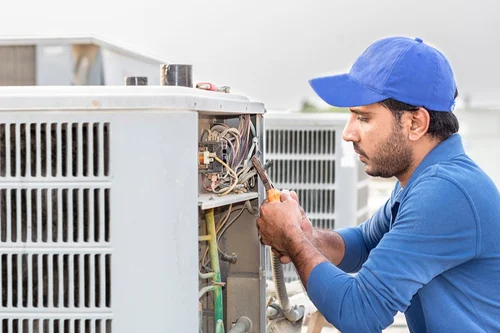Avoid hotter parts of the house:
If you want to keep your air conditioner from overheating, you should never put it in a sunny room or the backyard. Although it may seem logical to install an air conditioner in the warmest part of your home, doing so will force your air conditioner to work much harder than it would otherwise need to.
In exchange, you will have to pay a hefty amount for your monthly electricity payment. That’s why it’s not a good idea to put the AC unit right in the middle of the room. To avoid overheating, pick a position in the shade that is still close to the air conditioner.
Avoid hiding the ac:
You should not hide the air conditioner behind furniture or plants during the installation process. Just because you want to keep the air conditioner out of the sun does not mean you should try to hide it.
Concealing an air conditioner could have a negative impact on airflow. Outside, the coils may become obstructed by debris like leaves and twigs. As a result, you cannot risk not having the unit on hand.
No installation near fire hazards:
Most importantly, while installing an air conditioner in your home, be sure it is not located near anything that could catch fire. Always be aware of your surroundings and take precautions.
Make sure the air conditioner is not tucked away and is not situated near anything that could start or spread an electrical fire. You and your home could be in serious risk from this, so take precautions at all times.
Do not install ac near the trash can:
Putting the air conditioner in the room near the garbage can another source of frustration during the installation process. It would create an unpleasant odor in your home. In order to function correctly, an air conditioner needs a lot of room for ventilation and air filtration. The air around them is likewise sucked in by the air conditioner.
As a result, you may never again breathe in fresh air if you place your air conditioner next to the garbage can. Air conditioners typically take a lot of electricity, so it’s important to prevent sharing the circuits when installing one. Move the air conditioner to a new location, taking care to avoid electrical problems.
The size:
Having properly sized air conditioners installed in your home is essential. The room’s dimensions are an important factor to think about. To effectively cool a larger area, a more powerful air conditioner is required.
Air conditioners with lesser power ratings will not effectively cool a large room if installed there. When temperatures rise, this task becomes significantly more challenging. Also, if the room is not too big, do not put in a huge air conditioning unit. Doing so could be an inefficient use of resources and money.
Cost:
To cut money, many people opt for the cheapest air conditioning systems available. The more expensive units, however, save money in the future. They are effective in reducing electricity costs due to their low power consumption.
They are effective methods of cooling down interior spaces. It is strongly advised that you should not attempt DIY installation of such devices. A qualified service can efficiently and swiftly set up all required parts. In addition, when shopping for a new air conditioner, it’s important to keep your finances in mind.
Quality:
When selecting an air conditioning system for a home or business, price is certainly a concern, but quality should not be overlooked. It’s not uncommon for higher-priced systems to be of greater quality and have a longer useful life.
If you want to get the best air conditioner, you need to pay attention to its technical specs. If you want to avoid constant AC maintenance and replacement costs, you can get a high-quality system.
Efficient ductwork:
Make sure the duct system is in good working order before installing your air conditioner. Close up the cracks and keep the cold air inside where it belongs. Up to twenty percent of the environment’s cold air can be lost due to inefficient or outdated ductwork.
Duct issues can be fixed by hiring a professional firm or an AC expert. They efficiently perform system checks and repairs. Consult an expert for the installation of an AC.
Energy use:
If you want to save money on your monthly power bill, invest in a high-efficiency air conditioner. To determine which option will save you the most money, examine the EER rating (energy efficiency rating) from 8 – 11.5 is the scale used.
A higher score indicates that the system is more efficient at using energy. Air conditioners that save energy are eco-friendly. They do not contribute to global warming by giving off any heat or gas. Modern computers have features like programmable fan speeds, sleep modes, and digital temperature displays.
Air quality:
The air quality must meet the standards set for air conditioning systems. Manufacturers publish these details as best they can. Keeping the air quality in homes in good condition is crucial for the performance of cooling systems.
Durability:
Select an AC unit that will not require regular maintenance or replacement. Doing some independent investigation will lead you to the appropriate model. You may get in touch with a reliable local service. They will help you choose whether model or make of a certain product is the most reliable and affordable option in the long run. A reliable air conditioner will help you save money in the long term. The system should also come with a good guarantee.


